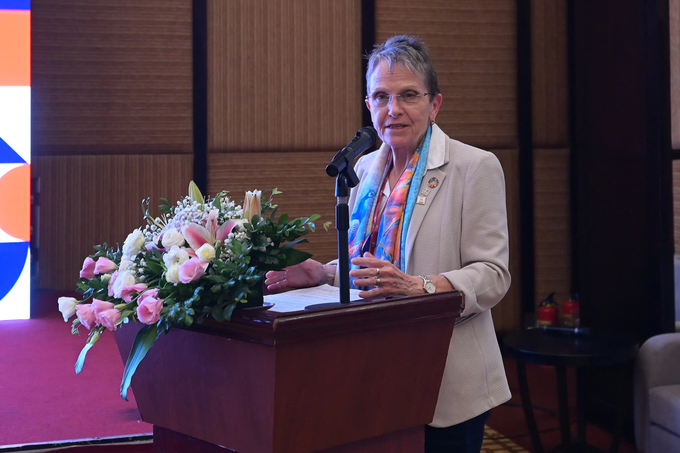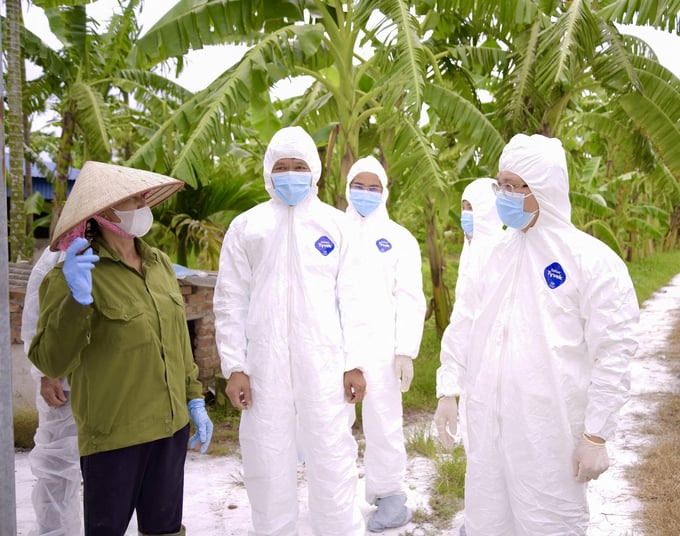November 21, 2025 | 03:51 GMT +7
November 21, 2025 | 03:51 GMT +7
Hotline: 0913.378.918
November 21, 2025 | 03:51 GMT +7
Hotline: 0913.378.918

Dr. Shirley Tarawali - Assistant Director General of ILRI delivered the opening speech at the workshop. Photo: Tung Dinh.
Speaking at the opening ceremony of the workshop “From research to policy: Improving animal disease prevention and control in Vietnam” on the afternoon of October 17, Dr. Shirley Tarawali, Assistant Director General of the International Livestock Research Institute (ILRI), emphasized that this event marks the first time domestic and international research organizations have joined hands with Vietnamese policymakers in a mutual effort to mitigate the impact of diseases on livestock production.
Dr. Tarawali noted that Vietnam’s livestock sector plays a crucial role in ensuring national food security. While African swine fever (ASF) is not as severe as zoonotic diseases, its recent outbreak has devastated the livelihoods of many Vietnamese farmers. Significant time and effort were required to restore livestock herds, with the outbreak also drastically reducing the supply of animal-sourced foods, particularly pork, a staple of the Vietnamese diet.
“These major challenges demand collaboration from all of us. Connecting research with policy is essential. In agriculture especially, policy must reflect real-world conditions and be grounded in scientific evidence to ensure effectiveness,” Dr. Tarawali emphasized.
She further explained that the workshop aims to bridge the gap between research and policymaking and explore how scientific findings can better inform the policy development process.
Reflecting on the recent One Health conference on October 16th, Dr. Tarawali shared how the event reinforced the importance of multi-way communication to prevent pandemics, control zoonotic diseases, ensure food safety, and combat antibiotic resistance.
“We need to ensure that research institutions, government agencies, the private sector, farming communities, and the media work in harmony. Their coordinated efforts will help identify the operational realities and needs of the livestock industry,” Dr. Tarawali concluded.

A mutual understanding of animal diseases among managers, scientists and farmers will promote ASF control in Vietnam. Photo: Dinh Muoi.
Recently, a policy study revealed that scientific evidence has had limited influence on policymaking. Up to 90% of scientific articles related to sustainable development goals (SDGs) are not referenced in policy documents, and even among those cited, nearly half are mentioned only once. This underscores the need for greater collaboration and mutual understanding to effectively translate science into practice.
From a Vietnamese researcher’s perspective, Dr. Pham Thi Ngoc, Acting Director of the National Institute of Veterinary Research (Ministry of Agriculture and Rural Development), emphasized the vital role that scientific institutions play in controlling ASF in Vietnam.
“The support from sponsors has provided us with the resources needed to focus on research. We also greatly value the leadership of the Department of Animal Health, which has continuously accompanied us, from conducting experiments in the lab to carrying out practical activities in the field,” Dr. Ngoc shared.
She explained that the Institute’s staff particularly appreciate opportunities for fieldwork, where they collect samples directly from local farms. Interacting with livestock farmers inspires them to return to the lab and pursue research directions that align closely with farmers' real needs.

Acting Director of the Veterinary Institute Pham Thi Ngoc speaks at the workshop. Photo: Tung Dinh.
The continued support from the Ministry of Agriculture and Rural Development, along with the Department of Animal Health, has given the Institute additional motivation. “It’s rewarding to see our research reflected in the policies and strategies guiding the agricultural sector’s development, especially in the livestock industry,” Dr. Ngoc asserted.
Addressing the workshop, Director of the Department of Animal Health Nguyen Van Long hoped to identify ways to strengthen the link between research and policy, ensuring that scientific evidence directly influences policy decisions. Accordingly, Dr. Long suggested that delegates make recommendations that can be integrated into the upcoming National Plan for African Swine Fever Prevention and Control, in order to improve the effectiveness of Vietnam's ASF control measures in the future.
Dr. Long highlighted: “To effectively control ASF, we need strong coordination among government agencies, research institutions, businesses, international partners, and, most importantly, pig farmers. This work will be supported by research that is synthesized and analyzed to inform the formulation of policies that respond to animal disease challenges.”
African swine fever (ASF) is a highly contagious viral disease that affects both domestic and wild pigs worldwide, including Southeast Asia and Vietnam. The disease can cause up to 100% mortality in infected herds, meaning that once infected, most pigs will not survive. ASF has been classified as an epidemic under Circular No. 24/2019/TT- BNNPTNT by the Ministry of Agriculture and Rural Development.

(VAN) Amid vast floodwaters, the spirit of sharing and helping others shown by many people in Gia Lai reached tens of thousands of residents stranded by raging floods.

(VAN) Climate change is set to emerge as a key focus of collaboration within the framework of the Comprehensive Strategic Partnership between Viet Nam and New Zealand.

(VAN) Future veterinarians will be the ones directly deciding how antibiotics are prescribed, administered, guided and managed across thousands of farms nationwide.

(VAN) Argentine Ambassador Marcos Antonio Bednarski says Viet Nam is playing an increasingly influential role in Argentina’s economic and technical engagement in Southeast Asia, as Buenos Aires is seeking long-term partners.

(VAN) Prime Minister requested local authorities to use all available measures to reach residential areas that are deeply flooded, cut off, isolated, or affected by landslides.

(VAN) To confront historic flood surge on Ba and Kon rivers, the Prime Minister requested local authorities to mobilize all available forces, evacuate residents, and ensure reservoirs and dams safety.

(VAN) The United Kingdom (UK) has offered to assist Vietnam in accessing significant financial resources to drive agricultural innovation while simultaneously expanding the market for forest-based carbon credits.